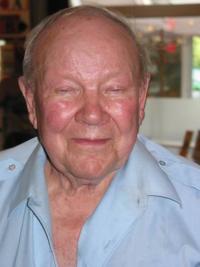“There was no time to be frightened. You must not think about it because if you would, you would go mad.”

Download image
Jan Svoboda was born in Brno on March 19, 1918. He did not agree with the occupation of Czechoslovakia during the war and that was why he tried to flee abroad. His first try failed. Eventually he fled on a bought Bulgarian passport from the Protectorate of Bohemia and Moravia through Bulgaria, Yugoslavia, Greece and Turkey. He joined the Czechoslovak army in Palestinian Haifa and on his own request was assigned to the RAF. He went through a language, military and an air training in Great Britain and Canada. He was a pilot of 310 Squadron RAF. He did 120 air attacks and took part in about 150 operating hours. As a fighter pilot he took part in combat operations in 1944 and 1945. In England he married a driver from 310 Squadron. He returned to Czechoslovakia after the war but due to his woman’s health problems they soon returned to Great Britain. He opened a garage there, he made and also raced in Formula 2. He even won the World Championships for Czechoslovakia. Due to his British citizenship he was allowed to visit Czechoslovakia since 1960.
